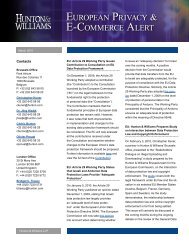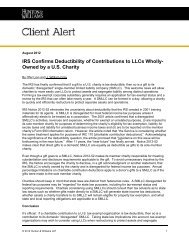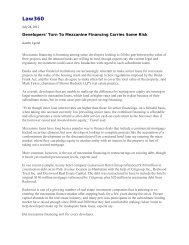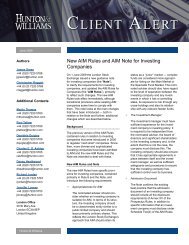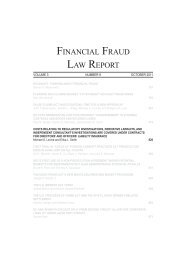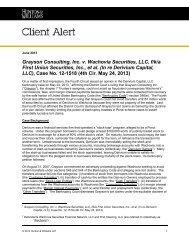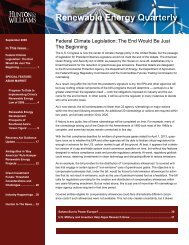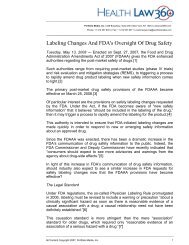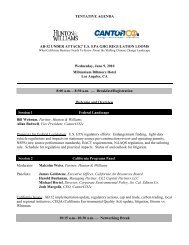European Privacy & E-Commerce Alert April 2008 - Hunton & Williams
European Privacy & E-Commerce Alert April 2008 - Hunton & Williams
European Privacy & E-Commerce Alert April 2008 - Hunton & Williams
You also want an ePaper? Increase the reach of your titles
YUMPU automatically turns print PDFs into web optimized ePapers that Google loves.
<strong>European</strong> <strong>Privacy</strong> &<br />
E-<strong>Commerce</strong> <strong>Alert</strong><br />
<strong>April</strong> <strong>2008</strong><br />
Contacts<br />
Brussels Office<br />
Park Atrium<br />
Rue des Colonies 11<br />
1000 Brussels<br />
Belgium<br />
P: +32 (0)2 643 58 00<br />
F: +32 (0)2 643 58 22<br />
Christopher Kuner<br />
+32 (0)2 643 58 56<br />
ckuner@hunton.com<br />
Dr. Jörg Hladjk<br />
+32 (0)2 643 58 28<br />
jhladjk@hunton.com<br />
Isabelle Chatelier<br />
+32 (0)2 643 58 33<br />
ichatelier@hunton.com<br />
Cedric Burton<br />
+32 (0)2 643 58 29<br />
cburton@hunton.com<br />
London Office<br />
30 St Mary Axe<br />
London EC3A 8EP<br />
+44 (0)20 7220 5700 Phone<br />
+44 (0)20 7220 5772 Fax<br />
Bridget C. Treacy<br />
+44 (0)20 7220 5731<br />
btreacy@hunton.com<br />
EU: ECJ Renders Judgment in<br />
Promusicae Case<br />
On January 29, <strong>2008</strong>, the <strong>European</strong> Court<br />
of Justice (ECJ) rendered its judgment<br />
in Promusicae, the first case in which<br />
the Court has specifically dealt with the<br />
tension between data protection and<br />
online enforcement—see Case C-275/06,<br />
Productores de Música de España<br />
(Promusicae) v. Telefónica de España<br />
SAU.<br />
In its judgment, the Court found that EU<br />
Member States are not obliged under<br />
Community law to require disclosure<br />
of personal data in the context of civil<br />
proceedings for the purpose of copyright<br />
protection, but that they may require such<br />
disclosure, and that in transposing the<br />
various directives on intellectual property,<br />
e-commerce and data protection, Member<br />
States must strike a fair balance between<br />
the fundamental rights that they protect,<br />
and must respect general principles of<br />
Community law, such as the principle<br />
of proportionality. This case was initiated<br />
by the Spanish rightsholder group<br />
Promusicae, which sought to obtain a<br />
court order in Spain against the internet<br />
service provider (ISP) Telefónica obliging<br />
the latter to disclose identity data on P2P<br />
users of the KaZaA network. Such users<br />
were engaged in the illegal uploading of<br />
copyrighted musical works. Telefónica<br />
argued that the communication of such<br />
data was authorized under Spanish law<br />
only for a criminal investigation or to<br />
safeguard public security and the national<br />
defense. The Spanish court initially<br />
granted the order sought by Promusicae,<br />
but following an appeal by Telefónica<br />
decided to stay the proceedings and consult<br />
the ECJ on the conformity of Spanish<br />
law with Community law.<br />
The ECJ judgment is available (in English)<br />
at: http://curia.europa.eu/jurisp/cgi-bin/<br />
form.pl?lang=en&newform=newform&allju<br />
r=alljur&jurcdj=jurcdj&jurtpi=jurtpi&jurtfp=ju<br />
rtfp&alldocrec=alldocrec&docj=docj&doco<br />
r=docor&docop=docop&docav=docav&do<br />
csom=docsom&docinf=docinf&alldocnore<br />
c=alldocnorec&docnoj=docnoj&docnoor=d<br />
ocnoor&typeord=ALLTYP&allcommjo=allc<br />
ommjo&affint=affint&affclose=affclose&nu<br />
maff=C-275%2F06&ddatefs=&mdatefs=&y<br />
datefs=&ddatefe=&mdatefe=&ydatefe=&n<br />
omusuel=&domaine=&mots=&resmax=10<br />
0&Submit=Submit<br />
The ECJ press release is available (in<br />
English) at: http://curia.europa.eu/en/actu/<br />
communiques/cp08/aff/cp080005en.pdf<br />
EU Commission Brings Suit against<br />
Germany<br />
On November 22, 2007, the <strong>European</strong><br />
Commission brought before the <strong>European</strong><br />
Court of Justice (ECJ) an action against<br />
the Federal Republic of Germany for<br />
failure to fulfill its obligations under the<br />
second sentence of Article 28(1) of<br />
Directive 95/46/EC (Case C-518/07),<br />
which requires national data protection<br />
authorities (DPAs) to be independent. The<br />
<strong>Hunton</strong> & <strong>Williams</strong> LLP
<strong>European</strong> Commission considers that<br />
the Federal Republic of Germany has<br />
not fulfilled these obligations, since the<br />
supervisory authorities responsible for<br />
the monitoring of data processing within<br />
the private sector in the German Länder<br />
are subject to State supervision and<br />
thereby do not fulfill the requirement of<br />
“complete independence”.<br />
Background information about Case<br />
C-518/17 is available at: http://eur-lex.<br />
europa.eu/LexUriServ/LexUriServ.<br />
do?uri=OJ:C:<strong>2008</strong>:037:0008:0009:EN:<br />
PDF<br />
EU Commission Launches<br />
Public Consultation on RFID<br />
Recommendation<br />
The <strong>European</strong> Commission is currently<br />
drafting a recommendation that will<br />
address some of the privacy concerns<br />
expressed by stakeholders during a first<br />
public consultation on Radio Frequency<br />
Identification (RFID) held in 2006. The<br />
Commission is now conducting a broad<br />
consultation open to all interested<br />
parties on the articles that it considers<br />
including in its recommendation on<br />
the implementation of privacy, data<br />
protection and information security<br />
principles in applications supported<br />
by RFID. The recommendation is<br />
scheduled to be adopted before the<br />
summer of <strong>2008</strong>. The consultation will<br />
end on <strong>April</strong> 25, <strong>2008</strong>, after which the<br />
various contributions will be published<br />
on the Commission’s web site, unless<br />
otherwise requested.<br />
Further information on the<br />
consultation is available at: http://<br />
ec.europa.eu/yourvoice/ipm/forms/<br />
dispatch?form=RFIDRec<br />
Finland Requires Opt-in Consent for<br />
“Tell-a-Friend” Marketing<br />
New guidelines jointly published on<br />
January 15, <strong>2008</strong> by the Data Protection<br />
Ombudsman, the Consumer Agency<br />
and the Consumer Ombudsman<br />
introduce an opt-in regime for “tella-friend”<br />
marketing (so-called “viral”<br />
marketing) involving text messages<br />
and electronic mails. Pursuant to the<br />
Finnish Act on the Protection of <strong>Privacy</strong><br />
in Electronic Communications, electronic<br />
commercial communications may not<br />
be sent without the recipient’s prior and<br />
explicit consent. The guidelines clarify<br />
that the Act is also applicable to situations<br />
where such communications are<br />
exchanged between private individuals.<br />
Prior consent of the recipient is thus<br />
required when users forward a message<br />
originally prepared by a company to<br />
their private social contacts. The DPA’s<br />
guidance is available (in Finnish and<br />
Swedish) at: http://www.tietosuoja.<br />
fi/42171.htm<br />
France: CNIL Releases New Biometric<br />
Policy Guidelines<br />
On December 12, 2007, the French<br />
Data Protection Authority (CNIL) presented<br />
new guidance on the conditions<br />
that must be met in order to use biometric-based<br />
identification systems. The<br />
CNIL laid down four key criteria to be<br />
used when examining future requests,<br />
namely: (1) the use of biometric systems<br />
should be limited to the purpose of controlling<br />
access by a limited number of<br />
people to a zone with high security risks;<br />
(2) biometric systems should be proportionate<br />
to the purposes and the risks; (3)<br />
they should guarantee both the effective<br />
identification or authentication of<br />
individuals and the security of personal<br />
data; and (4) appropriate notice must<br />
be provided to individuals in compliance<br />
with French privacy and labor law. In<br />
2007, the CNIL received 602 biometric<br />
authorization requests, among which 53<br />
notifications concerned fingerprint-based<br />
identification systems, of which 32 were<br />
approved and 21 rejected.<br />
The full text is available (in<br />
French) at: http://www.cnil.fr/index.<br />
php?id=2363&news<br />
France: Suspended Jail Sentence<br />
Ordered for E-mail Spying<br />
A Paris High Court decision of June<br />
6, 2007 ordering for the first time a<br />
jail sentence for e-mail spying was<br />
recently made public. In November<br />
2005, the managers of a French finance<br />
firm (Oddo et Cie) asked the police<br />
to investigate how information from<br />
confidential board meetings could have<br />
been leaked to the press. The police<br />
investigation revealed that a former<br />
external computer consultant used passwords<br />
of top managers collected during<br />
his stay at the firm to fraudulently enter<br />
the firm’s computer and e-mail system.<br />
The Court found the consultant guilty of<br />
violating the secrecy of correspondence<br />
of two top managers and of fraudulent<br />
access to a protected computer system,<br />
and sentenced him to a six months’<br />
suspended jail sentence.<br />
The Paris High Court decision is available<br />
(in French) at: http://www.legalis.<br />
net/breves-article.php3?id_article=2179<br />
Ireland: DPA Issues Card Payment<br />
Guidance<br />
On January 8, <strong>2008</strong>, the Irish Data<br />
Protection Commissioner issued new<br />
guidance on the processing of credit and<br />
debit card payments in compliance with<br />
section 2(1) of Ireland’s Data Protection<br />
Acts 1988 and 2003 regarding the collection<br />
and retention of personal data.<br />
<br />
www.hunton.com
Under the guidance, where personal<br />
data stored on a card is collected for the<br />
purposes of a transaction, the purpose<br />
for this collection ends with completion<br />
of the payment for a product or service.<br />
Moreover, personal data obtained from<br />
a payment card for a particular transaction<br />
cannot be used subsequently for<br />
other transactions without the card<br />
holder’s express consent. In addition,<br />
data controllers should adopt measures<br />
to ensure that information obtained for<br />
one purpose may not be accessed and<br />
used for another purpose. Finally, data<br />
controllers must specify the retention<br />
period of personal data and its purpose.<br />
Once retention is no longer required, the<br />
data must be deleted or securely stored<br />
(e.g., personal data collected from a<br />
card should be retained for a maximum<br />
of thirteen months).<br />
The Guidance is available at:<br />
http://www.dataprotection.ie/viewdoc.<br />
asp?DocID=581&m=f<br />
Netherlands: DPA Seeks More<br />
Enforcement Powers<br />
On January 28, <strong>2008</strong>, Dutch DPA<br />
chairman Jacob Kohnstamm issued a<br />
statement calling for more enforcement<br />
powers for his organization. He stated<br />
that: ”[…] because of rapidly changing<br />
technology, we need to be able to take<br />
more direct action, such as investigations<br />
and fines […]”. Recently, there<br />
has been an increase in data protection<br />
awareness in the Netherlands, in particular<br />
owing to the governmental debate<br />
on two possible laws likely to affect privacy:<br />
(1) a ”pay-as-you-drive” law which<br />
will allow the government to track cars<br />
and trucks by camera in order to assess<br />
road taxes based on the distance driven;<br />
and (2) a proposal for a law that would<br />
create an electronic database of patient<br />
health records, accessible by medical<br />
personnel and insurance companies.<br />
The Dutch government so far has<br />
expressed no intention of increasing the<br />
DPA’s powers.<br />
The statement is available (in Dutch)<br />
at: http://www.cbpweb.nl/documenten/<br />
pb_<strong>2008</strong>0128_dataprotectiedag.<br />
stm?refer=true<br />
Spain Revises its Data Protection<br />
Legislation<br />
On December 21, 2007, the Spanish<br />
Council of Ministers adopted a royal<br />
decree (Royal Decree 1720/2007) that<br />
fully implements Organic Law 15/1999<br />
of December 13, 1999 on the protection<br />
of personal data. In particular, this<br />
Decree, which will enter into force on<br />
<strong>April</strong> 19, <strong>2008</strong>: (1) brings within its scope<br />
security measures for paper files as<br />
well as electronic files; (2) categorizes<br />
personal data based on three levels of<br />
security: “basic” for any type of data,<br />
“medium” for criminal, fiscal and social<br />
security data, and “high” for sensitive<br />
information such as trade union<br />
membership, ideology, religion, beliefs,<br />
ethnicity, health and sexual life, and<br />
data collected by the police; (3) clearly<br />
sets out the responsibilities of the data<br />
controller and introduces more rigorous<br />
provisions for the processing of data<br />
by companies; and (4) provides that no<br />
DPA prior authorization is required for<br />
international data transfers to a country<br />
that guarantees an adequate level of<br />
protection.<br />
The English version of Royal Decree<br />
1720/2007 is available at: https://www.<br />
agpd.es/index.php?idSeccion=347<br />
UK: ICO Takes Enforcement Action<br />
against Marks & Spencer<br />
On January 23, <strong>2008</strong>, the Information<br />
Commissioner’s Office (ICO) took<br />
enforcement action against the supermarket<br />
chain Marks & Spencer (M&S)<br />
following the theft of a laptop computer<br />
containing pension information of its<br />
employees. The laptop was unencrypted<br />
and contained the personal information<br />
of 26,000 M&S employees. According<br />
to the ICO, pursuant to section 27(1) of<br />
the Data Protection Act 1998, it was the<br />
responsibility of the data controller to<br />
respect the seventh data protection principle,<br />
according to which “appropriate<br />
technical and organisational measures<br />
shall be taken against unauthorised and<br />
unlawful processing of personal data<br />
and against accidental loss or destruction<br />
of or damage to personal data”.<br />
M&S has until <strong>April</strong> <strong>2008</strong> to comply with<br />
the enforcement notice to encrypt their<br />
employees’ personal data, failing which<br />
the ICO may initiate criminal proceedings.<br />
The ICO decision is available at: http://<br />
www.ico.gov.uk/upload/documents/<br />
pressreleases/<strong>2008</strong>/mands_en_final.pdf<br />
The enforcement notice is available<br />
at: http://www.ico.gov.uk/upload/<br />
documents/library/data_protection/<br />
notices/m_and_s_sanitiseden.pdf<br />
© <strong>2008</strong> <strong>Hunton</strong> & <strong>Williams</strong> LLP. Attorney advertising materials. These materials have been prepared for informational purposes only and are not legal advice.<br />
This information is not intended to create an attorney-client or similar relationship. Please do not send us confidential information. Past successes cannot be an<br />
assurance of future success. Whether you need legal services and which lawyer you select are important decisions that should not be based solely upon these<br />
materials.<br />
Atlanta • Austin • Bangkok • Beijing • Brussels • Charlotte • Dallas • Houston • London • Los Angeles • McLean • Miami • New York • Norfolk • Raleigh • Richmond • Singapore • Washington



